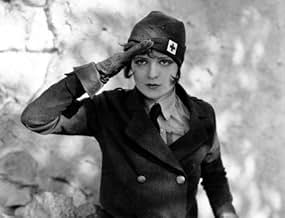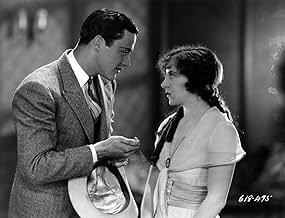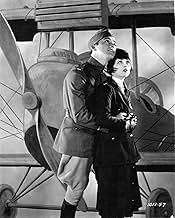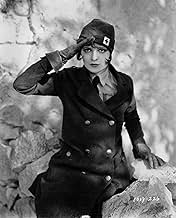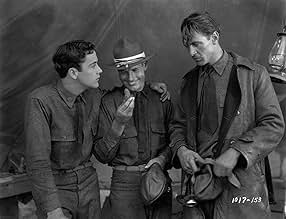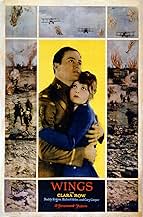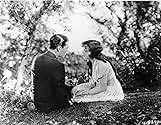AVALIAÇÃO DA IMDb
7,5/10
16 mil
SUA AVALIAÇÃO
Dois jovens, um rico e outro de classe média, apaixonados pela mesma mulher, tornam-se pilotos de caça na Primeira Guerra Mundial.Dois jovens, um rico e outro de classe média, apaixonados pela mesma mulher, tornam-se pilotos de caça na Primeira Guerra Mundial.Dois jovens, um rico e outro de classe média, apaixonados pela mesma mulher, tornam-se pilotos de caça na Primeira Guerra Mundial.
- Direção
- Roteiristas
- Artistas
- Ganhou 2 Oscars
- 9 vitórias e 1 indicação no total
Charles 'Buddy' Rogers
- Jack Powell
- (as Charles Rogers)
Charles Barton
- Soldier Flirting with Mary
- (não creditado)
Thomas Carr
- Aviator
- (não creditado)
Thomas Carrigan
- Undetermined Role
- (não creditado)
Margery Chapin
- Peasant Woman
- (não creditado)
Andy Clark
- Undetermined Role
- (não creditado)
Avaliações em destaque
Wings (1927), is not only the FIRST winner of the Best Picture Academy Award, it may be the BEST film to hold that title, and I say that knowing that Casablanca, Gladiator, and The Last Emperor all hold the statue too. There have been some stinkers dubbed "Best Picture" in the past, (Shakespeare in Love beating Saving Private Ryan??? The Greatest Show on Earth over High Noon?! Spare us all) but this is not one of them.
Even supporters of the film, writing reviews here at IMDb, can't seem to resist taking shots at Wings' plot, but I'm here to tell you it is just fine, even solidly written. Some reviewers don't sound like they have seen this movie in a long time, or if they have, they slept through it. For one thing, the "Love Triangle" is not as convoluted or hard to grasp as others have implied:
Jack Powell (Buddy Rogers) has a crush on one Sylvia Lewis (Jobyna Ralston), the local beauty queen. She finds this cute and indulges it a little bit--actually too much. But she is quite sincerely in love with someone else, David Armstrong (Richard Arlen) a well-off local boy who isn't quite able to figure out how to tell Jack to butt-out because it doesn't involve money. The wild card in all of this (literally and figuratively) is Mary Preston (Clara Bow), who lives next door to Jack and has been mooning over him since she was a little girl.
That's the whole dynamic. I have no idea what someone was thinking when they suggested Mary expressed any feelings for David (She never does). Some have said they can't believe Jack would go for Sylvia with Mary next door. I see their point, because the casting of Clara Bow in her role is like having Kirsten Dunst living next door and not noticing. The problem is, Jack isn't SUPPOSED to notice Mary until the end, when he has experienced the war and realizes that everything he wants is right there at home where he belongs. In the beginning he is all about Fast Cars and the Trophy Girls.
So, the plot thickens as the US gets dragged into World War I and both Jack and David sign up as pilots. Naturally each of them heads to Sylvia's house to say good-bye. Sylvia prepared a locket with her picture in it for David, but Jack sees it first. This scene is a great display of awkwardness wrapped in etiquette, especially when Sylvia tries to let go of Jack's hand. Jack takes the locket from her, and, this being more than she can stand, Sylvia almost gets the words out to tell him the truth when David gets there. At this point Jack turns on the macho-factor, and he is so gleeful about rubbing Sylvia's locket in David's face that he doesn't even notice she never kissed him good-bye.
Sylvia makes up for David's loss of the locket with some tender words and some passionate kissing--no mystery where her feelings lie--and the three of them head off for war. Three, because Mary goes too, as a nurse. Another complaint about this film and it's plot has been that Clara Bow wasn't given enough to do, shunted off into a side part even though she got billing as the Leading Lady, but I just don't see it. Her part was as big as any Romantic Interest in most movies out there; a good example for comparison would be Kathleen Quinlan's roll in Apollo 13. Most of her scenes were not shared with Tom Hanks, but she turned in an emotional and Oscar-nominated performance nonetheless.
The air battles in this film have never been topped anywhere. Ever. And that includes anything involving aliens, fighter jets, or a galaxy far, far, away. The information that the actors flew their own planes is misleading. Actors couldn't do what these pilots do. The stunt flying is by the US Army Air Corps in Texas (!) where the movie was filmed (I dare you to have guessed that on your own). What Rogers and Arlen do is all their own close-ups, flying the plane as they careen and dive. When the camera ran out of film (or the planes ran out of gas) a stunt pilot from the Army would pop up and land the plane.
The resolution of the story I won't comment further on, except to say that it is extremely moving and does highlight the madness of war, especially the kind of war WW1 was. I support military action for just causes, but everything has a cost and Wings lays that cost bare. These were issues being struggled over long before Vietnam, just in case you thought Hippies invented protest.
After complaining that she didn't do enough, some people insist that Mary's tactics in Paris were out of character. No they were not. Mary had to get Jack away from that "other woman" and get him his orders before he got court marshaled. She was not becoming a floozie, only dressing the part, and she paid the ultimate price for the risk she took. It also helped to stir up Jack's feelings about her in later scenes, and get him thinking.
Wings! Melodramatic? Sure. Unoriginal? Well... if you make that claim because you can guess what's coming or you've seen it all before, just ask yourself how old these movies are that you are comparing Wings to, and check Wings' release date again. Maybe the plot-heist occurred in the other direction.
This film deserves a DVD release. Barring that, see if you can track down the old Paramount Laserdisc, LV 2851-2, which is what I had. I have been enamored with, and watching, this film since I was 13 (30 now). It shattered my little-boy prejudices against both black and white and silent films in one great blast of anti-aircraft fire, and I have been spreading its gospel ever since. You will not ever see a better World War 1 film.
Even supporters of the film, writing reviews here at IMDb, can't seem to resist taking shots at Wings' plot, but I'm here to tell you it is just fine, even solidly written. Some reviewers don't sound like they have seen this movie in a long time, or if they have, they slept through it. For one thing, the "Love Triangle" is not as convoluted or hard to grasp as others have implied:
Jack Powell (Buddy Rogers) has a crush on one Sylvia Lewis (Jobyna Ralston), the local beauty queen. She finds this cute and indulges it a little bit--actually too much. But she is quite sincerely in love with someone else, David Armstrong (Richard Arlen) a well-off local boy who isn't quite able to figure out how to tell Jack to butt-out because it doesn't involve money. The wild card in all of this (literally and figuratively) is Mary Preston (Clara Bow), who lives next door to Jack and has been mooning over him since she was a little girl.
That's the whole dynamic. I have no idea what someone was thinking when they suggested Mary expressed any feelings for David (She never does). Some have said they can't believe Jack would go for Sylvia with Mary next door. I see their point, because the casting of Clara Bow in her role is like having Kirsten Dunst living next door and not noticing. The problem is, Jack isn't SUPPOSED to notice Mary until the end, when he has experienced the war and realizes that everything he wants is right there at home where he belongs. In the beginning he is all about Fast Cars and the Trophy Girls.
So, the plot thickens as the US gets dragged into World War I and both Jack and David sign up as pilots. Naturally each of them heads to Sylvia's house to say good-bye. Sylvia prepared a locket with her picture in it for David, but Jack sees it first. This scene is a great display of awkwardness wrapped in etiquette, especially when Sylvia tries to let go of Jack's hand. Jack takes the locket from her, and, this being more than she can stand, Sylvia almost gets the words out to tell him the truth when David gets there. At this point Jack turns on the macho-factor, and he is so gleeful about rubbing Sylvia's locket in David's face that he doesn't even notice she never kissed him good-bye.
Sylvia makes up for David's loss of the locket with some tender words and some passionate kissing--no mystery where her feelings lie--and the three of them head off for war. Three, because Mary goes too, as a nurse. Another complaint about this film and it's plot has been that Clara Bow wasn't given enough to do, shunted off into a side part even though she got billing as the Leading Lady, but I just don't see it. Her part was as big as any Romantic Interest in most movies out there; a good example for comparison would be Kathleen Quinlan's roll in Apollo 13. Most of her scenes were not shared with Tom Hanks, but she turned in an emotional and Oscar-nominated performance nonetheless.
The air battles in this film have never been topped anywhere. Ever. And that includes anything involving aliens, fighter jets, or a galaxy far, far, away. The information that the actors flew their own planes is misleading. Actors couldn't do what these pilots do. The stunt flying is by the US Army Air Corps in Texas (!) where the movie was filmed (I dare you to have guessed that on your own). What Rogers and Arlen do is all their own close-ups, flying the plane as they careen and dive. When the camera ran out of film (or the planes ran out of gas) a stunt pilot from the Army would pop up and land the plane.
The resolution of the story I won't comment further on, except to say that it is extremely moving and does highlight the madness of war, especially the kind of war WW1 was. I support military action for just causes, but everything has a cost and Wings lays that cost bare. These were issues being struggled over long before Vietnam, just in case you thought Hippies invented protest.
After complaining that she didn't do enough, some people insist that Mary's tactics in Paris were out of character. No they were not. Mary had to get Jack away from that "other woman" and get him his orders before he got court marshaled. She was not becoming a floozie, only dressing the part, and she paid the ultimate price for the risk she took. It also helped to stir up Jack's feelings about her in later scenes, and get him thinking.
Wings! Melodramatic? Sure. Unoriginal? Well... if you make that claim because you can guess what's coming or you've seen it all before, just ask yourself how old these movies are that you are comparing Wings to, and check Wings' release date again. Maybe the plot-heist occurred in the other direction.
This film deserves a DVD release. Barring that, see if you can track down the old Paramount Laserdisc, LV 2851-2, which is what I had. I have been enamored with, and watching, this film since I was 13 (30 now). It shattered my little-boy prejudices against both black and white and silent films in one great blast of anti-aircraft fire, and I have been spreading its gospel ever since. You will not ever see a better World War 1 film.
For a feeling of what the silents were really like, look for the version of this film with Gaylord Carter performing the score on a Wurlitzer Theater Organ. Carter recorded this version in the 1980's when he was in his 80's. Amazing performance - basically 120 minutes of live, somewhat improvised music with establihed themes for each character. Incidental music was improvised live combining themes from the various characters.
Carter was one of the last musicians that performed during the silent era. Very few musicians understand how difficult this art form was, and Gaylor was one of the best. Each showing of the film was an original, never before heard version due to the improvisational nature of the music. The stamina required to play live music, on 3, 4 or even 5 keyboards with a pedal board and dozens of stops, thousands of pipes for over two hours cannot be overstated. Especially when one of these performers were expected to do so 3 or more times a day!
Orchestras are all well and good, but few theaters could afford them - Wurlitzer (and a few other companies) sold 40,000 instruments to theaters world wide during the 20's, and chances are, 90% of screenings of this film were accompanied by a theater organ.
Carter was one of the last musicians that performed during the silent era. Very few musicians understand how difficult this art form was, and Gaylor was one of the best. Each showing of the film was an original, never before heard version due to the improvisational nature of the music. The stamina required to play live music, on 3, 4 or even 5 keyboards with a pedal board and dozens of stops, thousands of pipes for over two hours cannot be overstated. Especially when one of these performers were expected to do so 3 or more times a day!
Orchestras are all well and good, but few theaters could afford them - Wurlitzer (and a few other companies) sold 40,000 instruments to theaters world wide during the 20's, and chances are, 90% of screenings of this film were accompanied by a theater organ.
You could justifiably criticize WINGS lesser moments: the naive, "gee-whiz" dialog...the less than comedic "champagne" sequence in Paris...any of the romantic scenes...the idealized view of military life.... But as light entertainment, WINGS manages to hold its own, despite the passage of years. The battle scenes, easily the highlight of the film, may not have the intensity of later films, but the narrative is clear and precise. And this was not meant to be the last word in documentary accuracy: it's an adventure film tinged with romance, with engaging aerial fight scenes that capture your attention whenever they occur.
And personally, I felt that the music from the Wurlitzer organ tied together the film's various themes, musical and narrative, quite tidily.
And personally, I felt that the music from the Wurlitzer organ tied together the film's various themes, musical and narrative, quite tidily.
My cousin Clifford M. Blackstone Sr. was the person who filmed the flight scenes in this movie. His son Cliff sent me photographs of his Dad filming this movie as well as a few others with Paramount Studios. Cliff said his Dad was put in an airplane and sent up in the air to crank out all those amazing flight scenes. He said his Dad told him he wasn't even secured in the plane. Cliff Blackstone Sr. is from Mercer County, PA and Cliff Jr. says his Dad was the man who created the zoom lens. Just a side bar, Clara Bow, the lead actress in Wings, had a hairdresser Maryl who Clara introduced to Cliff Sr. Cliff Sr. married Maryl and they had Cliff Jr. It is really a nice story.
This film is, no doubt, a timeless triumph of the silent cinema. I first saw it three years ago and have seen it at least 30 times since then. I've only looked back to see that I have it in my collection...but not on DVD! These studios need to start thinking back to the days in which movies as good as these were made and stop producing so much garbage that they think will make tons of money without considering whether it's done right or not. This film taught me just how important gesture and body language can be in the acting world, whether it be on film or on stage. I know just how "in-character" an actor is just by looking at their face, their eyes, and how they're written in the script. Don't get me wrong, people can overact and underact in certain parts, but if you do anything without considering your character's expression or mood, regardless of whether or not your voice is unbearable to hear, you will never see success past the sound of crickets hiding in the audience. The industry knew that sound was coming. Most didn't accept this truth, but they knew it alright! "Wings" reminds those who've seen it, as with most classics of the silent cinema, that ACTIONS SPEAK A MUCH GREATER VOLUME THAN THE SPOKEN WORD. I've said all I need to say, and now I'll let this picture speak for itself.
Oscars Best Picture Winners, Ranked
Oscars Best Picture Winners, Ranked
See the complete list of Oscars Best Picture winners, ranked by IMDb ratings.
Você sabia?
- CuriosidadesWas lost for decades until a copy was discovered languishing in the Cinematheque Francaise film archive in Paris, France.
- Erros de gravaçãoThe film is set during the years 1917-1918, but most of the female civilian clothes and hairstyles are contemporary with the late 1920s, particularly the clothes worn by Clara Bow in the home sequences and in the Folies Bergère sequence. Bow and almost all the other female characters have bobbed hair, common in 1927 but almost non-existent during World War One.
- Citações
Sergeant in Mervale: Hey, if youse guys need kissin' *I'll* kiss you - wit' a gun-butt!
- Versões alternativasSome showings have trimmed Clara Bow's brief topless scene.
- ConexõesEdited into Os Dragões da Morte (1933)
- Trilhas sonorasThe Star Spangled Banner
(credited on 2012 restored score only)
Written by John Stafford Smith & Francis Scott Key
Principais escolhas
Faça login para avaliar e ver a lista de recomendações personalizadas
- How long is Wings?Fornecido pela Alexa
Detalhes
- Data de lançamento
- País de origem
- Idioma
- Também conhecido como
- Wings
- Locações de filme
- Camp Stanley, San Antonio, Texas, EUA(battle of St. Mihiel)
- Empresa de produção
- Consulte mais créditos da empresa na IMDbPro
Bilheteria
- Orçamento
- US$ 2.000.000 (estimativa)
- Faturamento bruto mundial
- US$ 1.684
- Tempo de duração
- 2 h 24 min(144 min)
- Cor
- Mixagem de som
- Proporção
- 1.33 : 1
Contribua para esta página
Sugerir uma alteração ou adicionar conteúdo ausente






